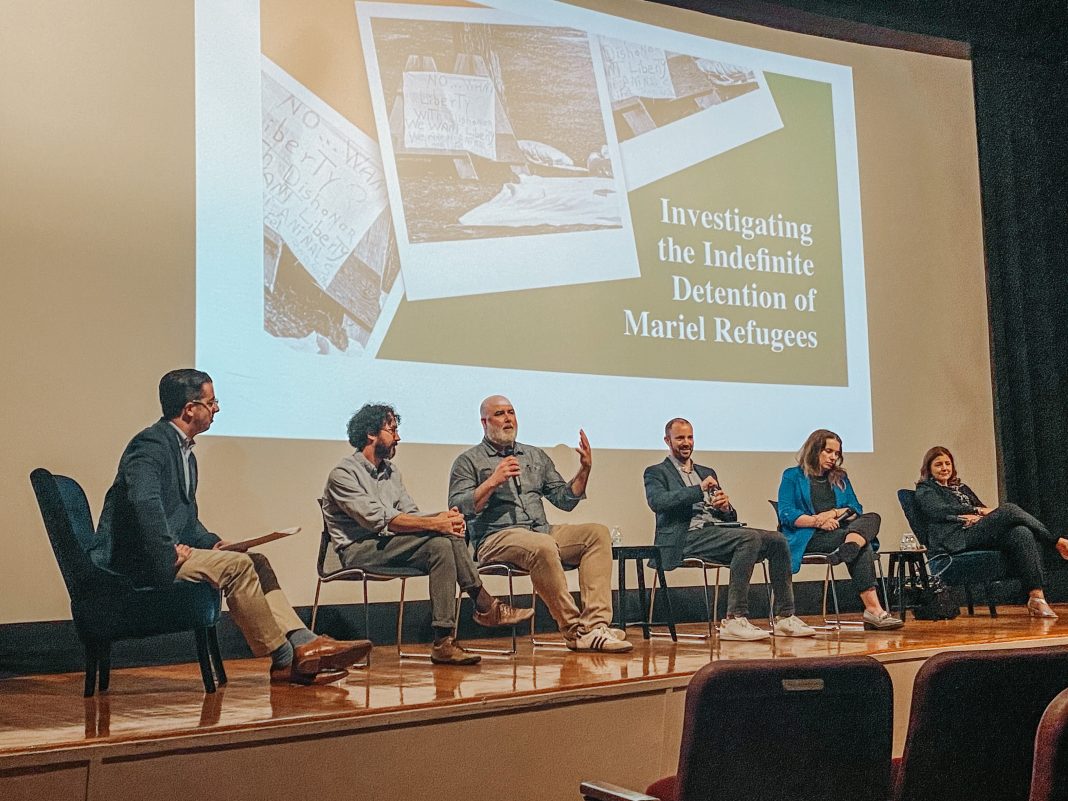
Nearly three decades ago, a group of Cuban refugees from the Mariel boatlift took over a federal prison in Talladega, Alabama. The uprising lasted 11 days.
Photos from the riot caught the attention of reporters Andrew Beck Grace and Chip Brantley, who would later feature the event in their NPR podcast White Lies.
On Monday, Feb. 27, the Bill Cosford Cinema at the University of Miami hosted a conversation with Grace and Brantley, along with several other panelists, highlighting stories from the Mariel Boatlift and the Talladega prison riot that have long remained untold.
The conversation addressed the events that led to the Mariel Boatlift and the prison uprising, along with discussions about migration, incarceration and many of the flaws within the U.S. criminal justice system.
“Neither one of us growing up in Alabama never heard about this prison takeover,” Grace said. “It was just a very peculiar thing. And the minute that we started digging into it, we realized that there was this massive riot that happened in Atlanta and Oakdale.”
On the morning of Aug. 21, 1991, the group of Cuban detainees staged an uprising for their freedom, protesting their incarceration as they awaited sponsorship in the U.S.
A group of men standing in a recreation yard at the prison were able to overpower the guards, taking their keys and releasing 119 detainees from their cells.
News of the uprising soon erupted across American media outlets, bringing national attention to the group of Cubans detainees on the roof of a federal prison.
While many photographers were eager to get up close and document the event, the Bureau of Prisons and the Department of Justice kept these photographers about a quarter mile away from the prison, avoiding any further media attention.
Despite efforts to shield photographers from the event, a collection of photographs from the riot soon became public.
However, this wasn’t the first instance where the U.S. system had failed them.
“In 1982, when the last refugee resettlement camp closed, the remaining refugees there and the 300 to 500 refugees who were still seeking sponsorship were transferred to Atlanta,” Brantley said. “Their custody was then transferred to the Department of Health and Human Services to the Department of Justice–and they were sent to this federal prison.”
One of the panelists at the event emphasized Washington’s promises of prison reform and the termination of immigrant detention, which as of recent, have been largely unfulfilled.
“The U.S. very loudly proclaims that they are going to end immigration detention that is not compatible with America’s values. They say we’re only going to use it in the most exceptional circumstances–we’re only going to use it when migrants pose a threat to the United States, so this promise that we’ve ended immigration detention is never a true promise.” said Brianna Nofil, one of the panelists present at the discussion.
Brianna Nofil is an assistant professor of U.S. history at the College of William & Mary and a former Goizueta Dissertation Fellow at the University of Miami’s Cuban Heritage Collection. Her studies focus on the U.S. Criminal Justice System and the history of immigrant incarceration in the United States.
The panel also included Cuban-born author and journalist Mirta Ojito, who migrated to the United States through the Mariel Boatlift herself. Like many other Cuban migrants at the time, Ojito had been told that the U.S. was the land of opportunity, where one could attain freedom and success through hard work and achievement.
She discussed her experience as a Cuban migrant, highlighting the powerful message that the U.S. was sending from abroad.
“The gift they gave us was the gift of the truth. They told us the stories that we were eager to hear–yes, you have to work very hard, but the possibilities are endless,” Ojito said. “Not only was it the concept of freedom as a far away sort of philosophical idea. It was a very tangible thing that told you, ‘Yes, you can have freedom and you can also buy a car and go to Disney world,’ and that was a very powerful message.”
Students can learn more about the podcast and listen to the story of the Talladega prison riot here.





